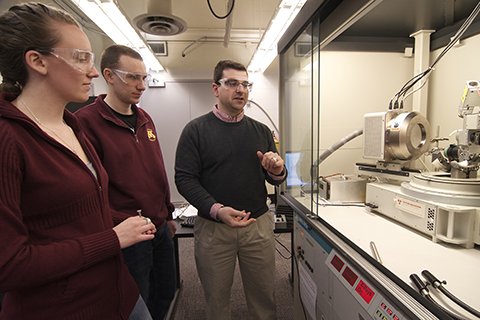Department of Chemical Engineering and Materials Science
The Department of Chemical Engineering and Materials Science is a top-tier, internationally competitive department with two thriving programs—chemical engineering and materials science and engineering. The undergraduate and graduate degree programs prepare students for careers in energy, biotechnology, medicine, microelectronics, pharmaceuticals, and polymer science.
Tradition of excellence
With roots extending to the later 19th century, the department has a long history as a nationwide leader. Prominent alumni include the inventors of the Post-it Note, Gore-Tex, and gluebond sandpaper, many executives at 3M, the former Global Climate and Energy Project director, and professors who helped build chemical engineering programs at other leading universities.
Notable accomplishments of current faculty
Of the 16 total University of Minnesota presidents, two have been faculty members in the Department of Chemical Engineering and Materials Science. Five current faculty are members of the National Academy of Engineering. Three current faculty are members of the American Academy of Arts and Sciences. Three faculty members are University of Minnesota Regents Professors.
World-class academics
Combining chemical engineering and materials science into one department provides students with unique educational opportunities for collaborations across disciplines. In addition to rigorous courses and hands-on lab experiences, a large percentage of students conduct on-campus research or receive industry experience through internships or co-ops. The Bachelor of Chemical Engineering (BChE) and Bachelor of Materials Science and Engineering (BMatSE) are accredited by the Engineering Accreditation Commission of ABET.
Cutting-edge research
Faculty and student researchers are leading breakthroughs in all aspects of chemical and materials engineering ranging from fluid mechanics, transport, catalysis, and reactor design to bioengineering, renewable energy, polymer synthesis and processing, and advanced semiconductor growth and characterization. Core faculty and affiliated graduate faculty are organized into 14 areas:
- Applied and Computational Mathematics
- Biological Engineering
- Catalysis, Separations and Reaction Engineering
- Electrochemical Materials and Devices
- Electronic, Magnetic and Photonic Materials
- Electronic Microscopy
- Energy
- Materials Processing
- Materials Theory
- Nanomaterials and Nanotechnology
- Nanomechanics and Plasticity
- Polymer Science and Engineering
- Systems Engineering
- Transport and Fluid Mechanics
Business and industry connections
The department has connections to major corporations such as 3M, General Mills, Cargill, and the Dow Chemical Company. Researchers also receive significant funding from the National Science Foundation, the National Institutes of Health, and the U.S. Department of Energy.
National Rankings
- The undergraduate and graduate programs consistently rank near the top of national rating scales.

